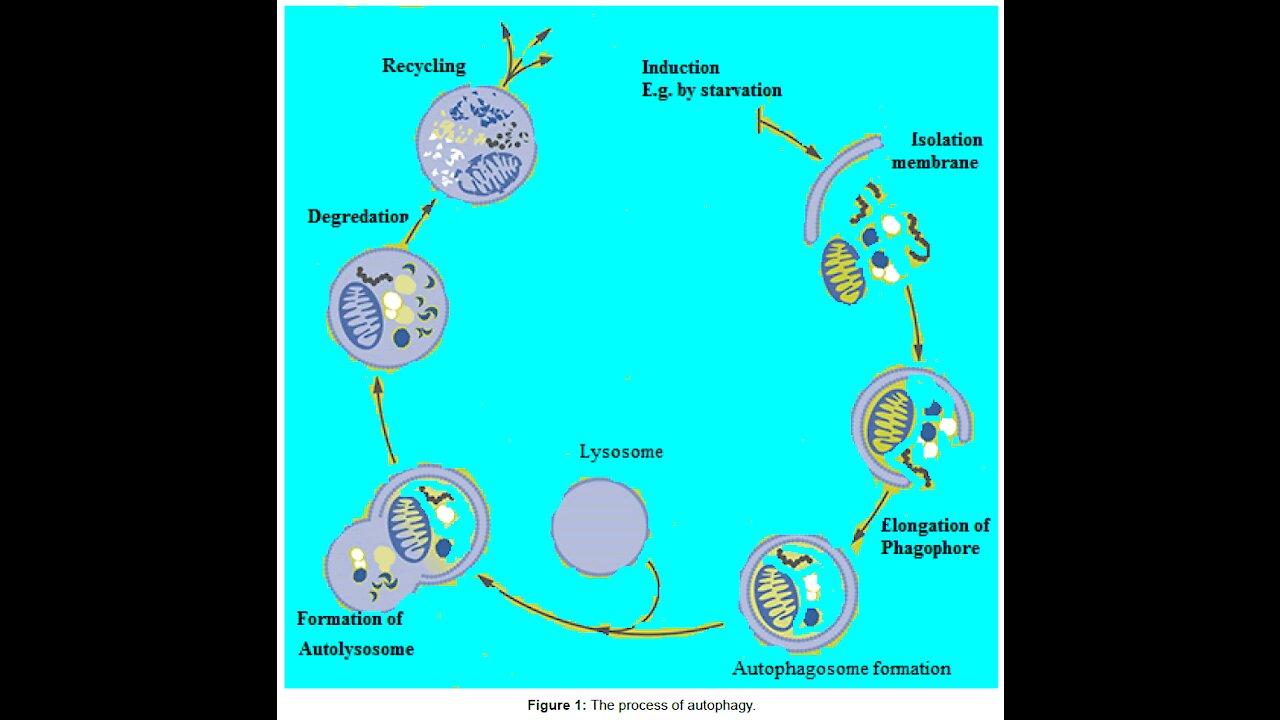Premium Only Content

Autophagy 101 - Everything You Need to Know - with Dr. William Dunn
The key to better health. Fasting for at least 16 hrs per day. Be in control of your food consumption and don't allow food to control you.
1. Autophagy may save your life.
Dramatic? Yes. But, scientifically accurate. Autophagy is an ancient mechanism whose main function is to preserve your life. During times of extreme stress, infection, or starvation, this process kicks in to maximize repair while minimizing damage. The combination of intermittent fasting (with some fat as fuel) while activating autophagy at the same time can both starve an infectious intruder of glucose, reduce inflammation so the immune system has an easier time taking action, and repair damage caused by both infection and inflammation. In short, animals evolved using autophagy to conserve energy and repair damage when energy became scarce, but it is also a critical part of the human immune system’s ability to battle illness and reduce risk of cancer.
2. Autophagy may improve your quality and length of life.
Anti-aging benefits may sound too good to be true, but beauty really does run far deeper than the skin. Since the 1950s, scientists have known about the process of autophagy, but recent studies have revealed more about how it improves your cellular health. Instead of taking in new nutrients, cells undergoing autophagy recycle the damaged parts they have, remove toxic material and fix themselves up. When your cells repair themselves, they work better, and they can behave like younger cells. You may have heard or noticed that some people have a very different chronological (time) and biological (life) age. How much toxic damage a body has taken and how it has been able to repair plays a large role in these differences.
3. Autophagy helps your metabolism work better.
Autophagy is a process of taking out trash and replacing cell parts, like mitochondria. Mitochondria are your cellular engines. They burn fat and make ATP, your body’s energetic currency. There is a lot of harsh toxic build up in mitochondria that can damage cells, and breaking them down proactively saves future wear and tear on your cells. Autophagy of other cell parts helps the entire cell work more efficiently not just to burn fuel but also to make proteins. Healthier cells work more efficiently.
4. Autophagy reduces risk of neurodegenerative diseases.
Many diseases of aging brains take so long to develop because they are the result of proteins in and around your brain cells that are misfolded and don’t work right. Autophagy helps cells clean up the proteins that aren’t doing their jobs and they are less likely to accumulate. For instance, in Alzheimer’s disease autophagy removes amyloid, and in Parkinson’s autophagy removes ⍺-synuclein. There is a reason dementia is thought of hand-in-hand with diabetes: constant high blood sugar keeps autophagy from activating, making it difficult to keep these cells clear of clutter!
5. Autophagy helps regulate inflammation.
Autophagy promotes a “goldilocks” amount of inflammation by helping to boost or quell the immune response you need. Autophagy can increase inflammation when an invader is present by triggering your immune system to attack. Most of the time, autophagy decreases inflammation from your immune response by removing the signals (proteins called antigens) that are triggering it.
6. Autophagy helps us fight infectious disease.
As mentioned above, autophagy can help recruit an immune response when needed. Secondly, the process of autophagy can remove certain microbes directly from the inside of cells, such as Mycobacterium tuberculosis, or viruses, such as HIV. Autophagy can also remove the toxins created by infections, which is especially important for food-borne illness.
7. Autophagy improves muscle performance.
As you create microtears and inflame muscles during exercise, the muscles require repair. Energy demand increases. Your muscle cells will respond to this by undergoing autophagy to reduce the energy required to use the muscle, degrade damaged components, and improve the balance of energy to reduce the risk of future damage.
8. Autophagy helps prevent cancer onset.
Autophagy can suppress processes that are pro-cancer like chronic inflammation, genome instability, and the DNA damage response. Mice that researchers have genetically engineered to have impaired autophagy have increased rates of cancer. As cancer progresses, it may activate autophagy to get alternative fuel or to hide from the immune system, though more research is needed. It is also unclear how much chemotherapy-induced damage to non-cancerous cells activates autophagy. In the future we may question how much damage chemotherapy does to cancer cells (killing them outright) versus to our own cells (activating autophagy to trigger an immune response that affects these cells). Again, more research is needed.
9. Autophagy improves your digestive health.
The cells that line your gastrointestinal tract are constantly asked to do work. In fact, a large part of your feces are your own cells! As a result of turning on autophagy, your digestive cells can repair and restore, clear themselves of junk, and reduce or activate the immune system as needed. Because a chronic immune response in the gut can overwhelm and inflame your bowels, a chance to rest, repair, and restore is critical to your gut health. Activate autophagy with a schedule that allows for an extended overnight fast and you can give your gut the space it needs to heal.
10. Autophagy improves your skin health.
The cells that you present to the world take a lot of damage from chemicals, air pollution, light, heat, cold, humidity changes, and physical damage. It’s a wonder they don’t look worse for wear! When your skin cells accumulate damage and toxins, they age in place. Even though you make new cells often, autophagy can help repair the existing ones so that you really glow! Skin cells, in particular, engulf bacteria that may damage the body, so it is very important to support them as they clear out the clutter.
11. Autophagy may support a healthy weight.
Here are some benefits of autophagy that also support a healthy weight:
Autophagy requires fat-burning to be turned on but spares protein. On very long fasts, you will lose protein mass, but in shorter periods of fasting, you can activate autophagy, burn fat, spare protein, and get all the benefits of a leaner, fitter you.
Autophagy quells unnecessary inflammation. Chronic inflammation raises insulin, causing more weight storage– so less inflammation helps reduce insulin levels.
Autophagy reduces toxins in your cells. As long as you can excrete those toxins, they are less likely to need fat cells to store them.
Autophagy supports metabolic efficiency by repairing the parts of cells that make and package proteins and process energy, which is particularly helpful when cells need to switch to fat-burning for energy.
12. Autophagy (cell-eating) minimizes apoptosis (cell death).
Apoptosis is programmed cell death. Compared to autophagy, the death of a cell is messy and creates garbage to clean up. Your body triggers some inflammation to do the clean-up. The more cells that repair themselves before they become damaged beyond repair, the less effort your body puts into cleaning up old cells and making new ones. Less inflammation is involved in renewing tissues. You can use that energy to replace cells that need more constant renewal, like skin or digestive cells. While there are some cells that must be turned over a lot, not all cells require this. More repair with less cleanup is a great combination for success.
-
 0:34
0:34
ShatteringTheMatrix
11 months agoAmerican Coal Worker - I hope all of you that are sitting at home nice and warm today
1.92K5 -
 2:35
2:35
WFTS
3 years agoEverything you need to know about postpartum depression
198 -
 1:06
1:06
AfricanNewsAgency
3 years ago $0.03 earnedEverything You Need To Know About Back Acne
3151 -
 3:13
3:13
WEWS
3 years agoEverything you need to know about Ohio's 'Vax-a-Million' drawings
66 -
 17:40
17:40
VSiNLive
1 day agoHow a TWEET Made Steve Fezzik DOUBLE DOWN on this Vikings Rams Bet Amidst the California Wildfires
51.2K4 -
 22:20
22:20
DeVory Darkins
20 hours ago $13.11 earnedGavin Newsom Suffers HUMILIATING Blow by Trump
47.9K83 -
 24:15
24:15
Stephen Gardner
1 day ago🚨New Evidence DESTROYS Gavin Newsom! Trump HITS BACK HARD!!
90.3K301 -
 14:59
14:59
TimcastIRL
7 hours agoH1-B Immigration ABUSED, You Cannot Import Your Way Out Of US Cultural Decay
74.1K39 -
 15:21
15:21
Forrest Galante
21 hours agoWorld's Deadliest Predator Up Close (Private Tour)
59.7K3 -
 2:49:49
2:49:49
BlackDiamondGunsandGear
17 hours agoBDGG live with DLD After Dark
28.2K2